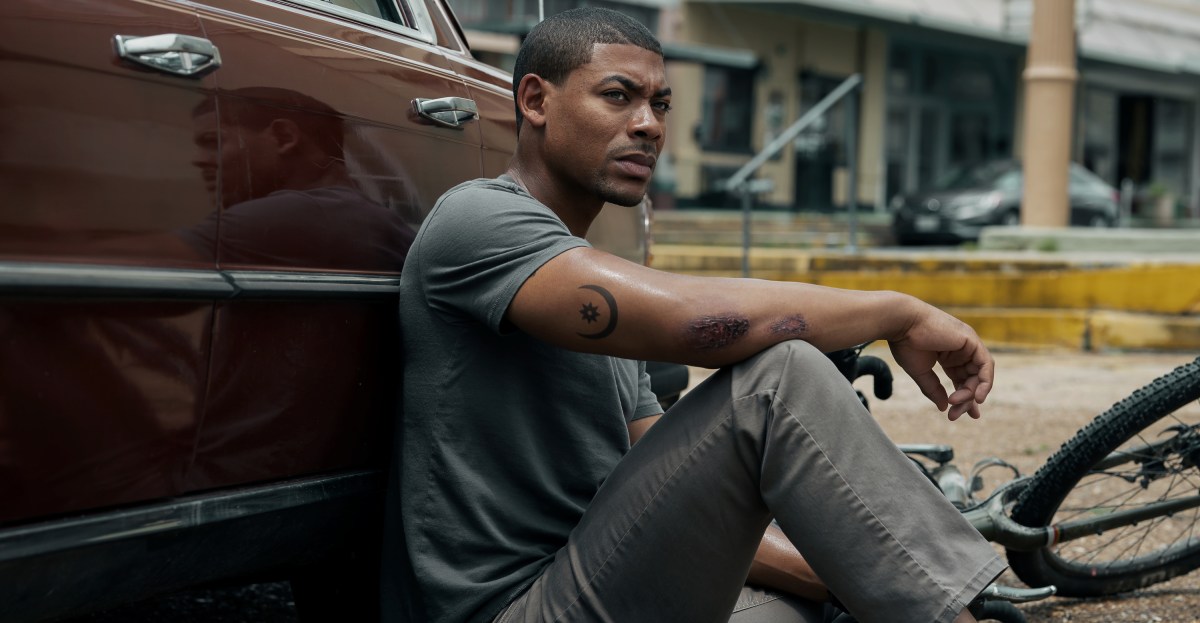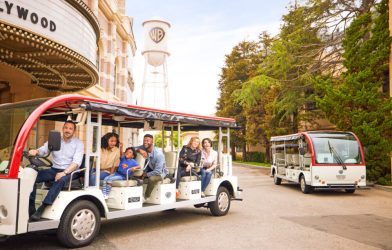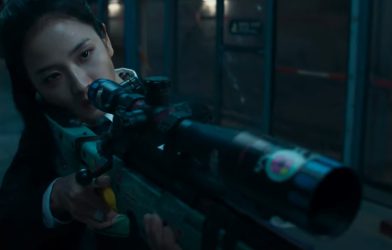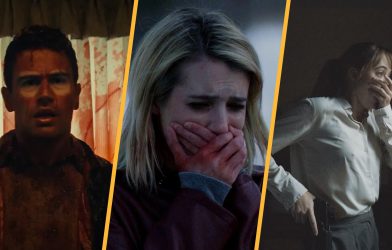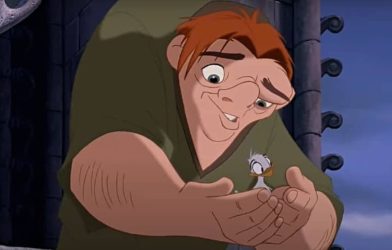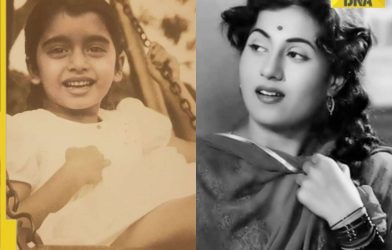Thriller fans know by now to keep an eye out for new Jeremy Saulnier movies. From his over-the-top horror debut Murder Party to the deceptively low-key one-two punch confrontation dramas of Blue Ruin and Green Room to the viciously chilly William Giraldi adaptation Hold the Dark, Saulnier specializes in moody films punctuated by shockingly graphic violence that often catches his protagonists off guard.
The tones of these movies vary widely, and so does their thinking about how necessary violence is, and what it does to the perpetrator. But they’re all visceral and memorable in different ways, and they all turn bloodshed into an unsettling, momentous event — a real achievement when working in so many genres where violence is common and expected, both by the protagonists and the audience.
The threat of violence hangs over nearly every minute of his Netflix movie Rebel Ridge, debuting on the service Sept. 6. Ex-Marine Terry Richmond (Aaron Pierre, from The Underground Railroad and M. Night Shyamalan’s Old) enters a small Southern town with a bag full of cash, acquired to bail his cousin out of jail. In the opening scene, the local police assault him and seize the money under civil asset forfeiture law, claiming it could possibly be drug money. The situation escalates from there — but it’s a slow-burn, deliberately paced procedural of an escalation, roping in the local police chief (action vet Don Johnson), a bureaucrat with secrets (AnnaSophia Robb), a respected local judge (James Cromwell), and many others.
Ahead of the movie’s Sept. 6 release, Polygon talked to Saulnier about threading the needle on a movie about some of the most polarizing, political issues in modern America, and about taking inspiration from Sylvester Stallone in First Blood, but not in the most obvious ways.
Polygon: This is a movie about a lot of different things, including the injustice of civil asset forfeiture. But it’s also about race and white supremacy in policing, even though no one in the film overtly admits their motives or prejudices. The Southern setting, Terry being Black, local law enforcement mostly being white, the specific role of the one cop who isn’t — it’s hard not to see race as a major factor here. How did you approach navigating that?
Jeremy Saulnier: It definitely is there, but as you said, not foregrounded — not because I wanted to shy away from it, but because I just wanted to stay true to a certain narrative. Cast the best actors and let things play out, and these broader themes come from the audience. Because we made a point not to go down that road, especially as it relates to Don Johnson and that character.
The primary goal here was to make a traditional American action flick, with ideally more artistry, a little headier. I like to get into the very grounded nature, the minutiae other films might pass by, as far as institutions go. Not just as it relates to race, but as it relates to human beings in these systems — what part they play, whether they’re aware of it or not, or if they are, how they choose to disavow their responsibility, or ignore the fact that they’re perpetuating corrupt systems. So those mechanics were easier to research and dissect.
When it came to casting the movie, I was just trying to find the right actor to help the movie. The only real thing on my mind — it’s written in the actual first draft of the script —, is that Terry is brown. […] It adds its own context that does not need any help from me, or pushing.
And when it came to those issues, I really drew a very hard line with the narrative, the structure, the characters, the dynamics: Once Aaron came aboard, I listened and I followed his lead. He was very loyal to the text, he was very reverent to not only myself as a filmmaker, but the entire crew, which supported him. He tried to give it his all, physically, emotionally. But when he had an issue as a Black man, [when something in the movie] reflected his experience, he was kindly vocal about it, and I followed his lead. And that was a very synergistic way of working, where I stayed true to what I knew as I developed the movie, and was very open to listening when Aaron spoke up.
Can you point to anything specific that he wanted to discuss or alter?
A lot of the specific conversations between me and the actors are private, not out of sensitivity, but because of the protocol. Sometimes it would just be vernacular, how he felt more comfortable expressing certain lines. And sometimes it was asking me about a bigger, broader context of what a scene meant, what it might be referring to. And sometimes he’d say “Well, OKokay, now that I understand the implications and the references here, I’d like to do this instead.” And the answer was always yes.
That didn’t happen very often, but that’s how I knew it was important to him. The amount of respect he gave the text, and the credit he gave the collaborators that surround him and support him, it was a really great dynamic on set. But when he does choose to inject something he feels passionate about, it was an easy yes.
You mentioned reaching back to classic American action — this very much feels like a modern version of the 1982 Sylvester Stallone movie First Blood, at least in terms of the story setup. Was that one on your mind as you were making Rebel Ridge?
The origin [of a project] is always hard to trace, exactly. But civil asset forfeiture intrigued me, and I thought it would be a great inciting incident for a film. And when I started to think about the narrative, and research it, I was bombarded by all this injustice. It was really infuriating. I thought it’d be a great way to get people behind a protagonist. It is a legal practice, but it’s inherently unjust, and it unifies everybody, because it’s universally reviled as a practice. Once that story started to evolve — this movie was more [Clint] Eastwood when I started out, it was more the Man With No Name. Terry rides into town not on a horse, but on a bike, but it was a Western genre movie, as far as I was concerned.
Once I realized this film would pit a single protagonist against a small-town police force, of course, First Blood was the primary reference I used to pitch this as a finished script. But [Terry in Rebel Ridge and John Rambo in First Blood are] very, different characters. They share a few things, they have a military background, but that’s about it. Terry is cerebral. He is a great communicator. He is trying his very best to earn and dish out a level of respect.
I thought it’d be interesting to explore the dynamic of a military veteran whose first combat experience was within the United States of America. But texturally, First Blood definitely was part of my look-book bible. The cinematography, how they integrated the lush landscape into the story — like when Stallone hops on that motorbike. Seeing the exhaust from the motorbike, and how it climbs up a muddy trail, and how the incline gets too high, and he falls off — it’s real people doing real things, just undeniable.
And that’s the level of filmmaking I was really wanting to bring back into the sphere. I miss things that look real, that have humans at the helm, that are a little sloppier and more grounded, and tied in emotionally with the on-screen action.
Looking back on all your previous films, one of the things that really unites them is the idea of people getting in over their heads in violent situations where they don’t necessarily have the experience or the tool kit to respond. Having Terry be a military veteran felt like a departure — but the way you describe it, it seems like you were looking at it similarly.
Well, I think you’re spot-on, in that he is a highly competent, skilled professional. He is portrayed as whip-smart and very disciplined. You get the idea that this guy is a very good communicator, but because he’s a traditional badass action-movie hero, compared to my previous filmography, I did find a way to put him in the mix as a fish out of water. Watching him flail in a bureaucracy in a small-town court, in the halls trying to find out who to talk to, having that nightmare customer service experience thwarting him, just trying to stay on the rails and having no luck navigating this convoluted, stifling system.
If there are two things in America we have a hard time talking about at all rationally, it’s race and any flaws in policing. There’s so much pushback against even acknowledging bias or injustice in American policing, let alone addressing it. What kind of calculations did you have to make around that?
Oh, I have to completely ignore that. As a filmmaker, if you go by that system of like, “What’s the internet gonna say?” then you might as well stay home. You can go tweet what your favorite ice cream is, and [people will respond] “Then you clearly never tasted this!” or like, “How dare you, when this manufacturer is…” It’s useless.
There’s no ambassadorship that Aaron has to take on as a person. He’s more than an ethnicity. He is one of the best actors I’ve ever come across in my life, and I’ll allow him the time and space to define how that serves us as a filmmaking team. So within the context of the film, I let Aaron take the lead. I don’t pretend to have any special knowledge, or speak for any group of people, about the charged nature of American policing.
I actually did tons of research. I pulled some dialogue from actual dashcam videos. But in Rebel Ridge, the goal was actually just to make sure I didn’t lean into any polarized views. Certainly we have a clear protagonist and a clear antagonist. But the challenge for me is not just to bring things down, as far as making everybody a human and having a chance to speak their truth, whether or not I’m rooting for them, or the audience will get behind them. It’s important that I create this battle space with characters that seem real, and they have real pressure and real plights, so that when this natural confrontation occurs, there’s real energy. Real characters create real drama. And that’s what I’m going for.
Other than that, I let the research dictate the level I was going for, as far as the reality. […] Civil asset forfeiture is legal. If it’s not legal in your state, you can bypass it and connect it to federal authorities, and still find ways to seize citizens’ property without tying it to a criminal charge. [I found] ranchers out in Texas that were having their entire property seized, and all the farm equipment on it, because they had a couple of marijuana plants on the property. Poker players getting $100,000 stolen because they were crossing state lines with cash, and accused of being drug dealers.
And the onus is always on the victim to prove where the money came from. And they use it against you as leverage. “You gonna hire a lawyer? Spend a couple years [chasing this]?” They say, basically, “We’ll take the money and keep it. We’ll let you go, but if you come after it, we’ll file criminal charges against you.” That’s an easy way to wear down the victims. So I was just going for a good old- fashioned American action movie, like a First Blood, Michael Clayton, High Plains Drifter. It was about staying true and staying tactile, as far as my approach as a filmmaker.
Rebel Ridge debuts on Netflix on Sept. 6.

